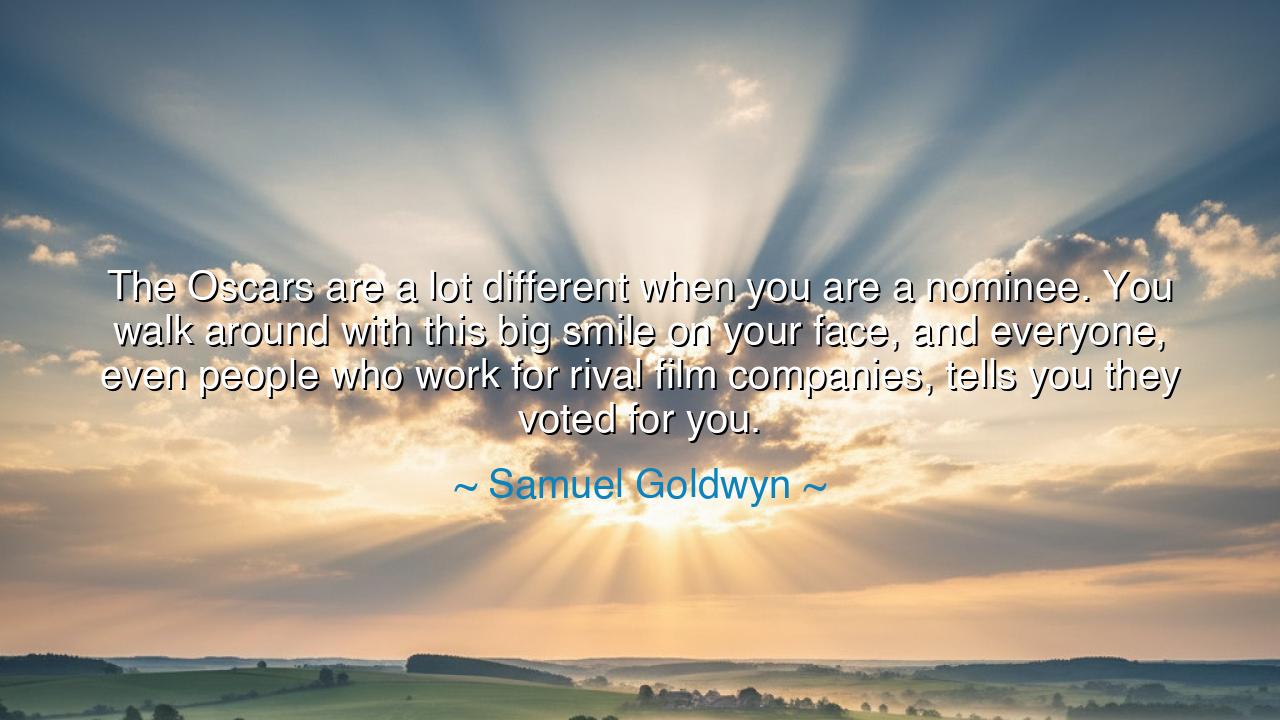
The Oscars are a lot different when you are a nominee. You walk
The Oscars are a lot different when you are a nominee. You walk around with this big smile on your face, and everyone, even people who work for rival film companies, tells you they voted for you.






Hear, O seeker of wisdom, the wry yet revealing words of Samuel Goldwyn: “The Oscars are a lot different when you are a nominee. You walk around with this big smile on your face, and everyone, even people who work for rival film companies, tells you they voted for you.” Though spoken in jest, this observation is steeped in the ancient truths of pride, rivalry, and the curious nature of human behavior when confronted with prestige.
The meaning of this reflection is layered. At its heart, it shows how recognition, or even the appearance of recognition, transforms the way people treat one another. To be named a nominee is to be lifted into the light of honor, and in that light, rivals set aside their claws, offering false kindness or genuine admiration. The smile on the nominee’s face is not just joy—it is the armor and currency of reputation. Goldwyn reveals, with humor, how success alters perception, not of the work itself, but of the person who carries it.
The origin of such behavior is older than the Academy Awards themselves. In ancient courts, when warriors or poets received praise from kings, rivals would suddenly soften, offering congratulations even if jealousy burned in their hearts. For prestige has always carried a magnetic force—it draws flattery, bends tongues, and compels even adversaries to cloak envy with politeness. The Oscars, though modern, are but another version of the amphitheater, where public honor changes the nature of private relationships.
History offers us striking examples. Consider Cicero, the Roman orator. In times of triumph, when he was celebrated by the Senate for his words and victories in court, even his bitter rivals would praise him publicly, swearing allegiance they did not feel. Yet in his downfall, when the tides turned against him, those same rivals abandoned him without hesitation. Goldwyn’s words capture this timeless cycle: prestige brings smiles and declarations of loyalty, but much of it is performance, shaped by the glow of recognition rather than the truth of devotion.
Yet Goldwyn’s reflection is not cynical alone—it also points to the intoxicating joy of being seen and celebrated. For the nominee, the world appears transformed: rivals seem like friends, every greeting feels warm, and the smile becomes a natural response to the energy of admiration. This shows the duality of human experience: the sweetness of recognition, and the illusions it weaves around us. The wise, therefore, must savor the joy without becoming blind to the masks that surround them.
The lesson here is powerful. Do not measure your worth solely by the smiles offered in your moment of recognition, for many will vanish when the lights go dim. Instead, find value in the work itself, in the craft and dedication that brought you to that stage. Enjoy the honor, yes, but understand that praise, especially from rivals, is often shaped by circumstance. The truest measure of greatness is not in how others treat you when you are celebrated, but in how they remember you when the celebration ends.
Practically, this teaching calls us to humility. Should recognition come your way—whether in career, art, or daily life—accept it with grace, but do not let it blind you. Share your smile, but remember that not every hand extended in friendship is free of envy. At the same time, be mindful of how you treat others when they are celebrated. Offer them sincerity, not hollow words. For the sincerity of our smiles is the true test of our character.
Thus, O listener, take this wisdom with you: honor is fleeting, smiles are many, but truth is rare. Enjoy the joy of recognition, yet ground yourself in authenticity. For when the stage lights fade and the rivals return to silence, it is your integrity, your work, and your legacy that endure beyond the applause.






AAdministratorAdministrator
Welcome, honored guests. Please leave a comment, we will respond soon